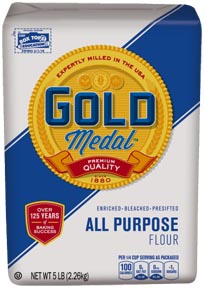 The FDA, CDC, and state and local officials investigated a multi-state outbreak of Shiga toxin-producing Escherichia coli (STEC) O121 and O26 infections. CDC reports that 63 people infected with the outbreak strains of E. coli O121, and O26 were reported from 24 states. Illnesses started on dates ranging from December 21, 2015 to September 5, 2016. Seventeen ill people were hospitalized, and one person developed hemolytic-uremic syndrome. In its investigation, CDC learned that some people who got sick had eaten or handled raw dough.
The FDA, CDC, and state and local officials investigated a multi-state outbreak of Shiga toxin-producing Escherichia coli (STEC) O121 and O26 infections. CDC reports that 63 people infected with the outbreak strains of E. coli O121, and O26 were reported from 24 states. Illnesses started on dates ranging from December 21, 2015 to September 5, 2016. Seventeen ill people were hospitalized, and one person developed hemolytic-uremic syndrome. In its investigation, CDC learned that some people who got sick had eaten or handled raw dough.
FDA’s traceback investigation determined that the raw dough eaten or handled by ill people or used in restaurant locations were made using General Mills flour that was produced in November 2015 and select production dates through February 10, 2016 at the General Mills facility in Kansas City, Missouri. Epidemiology, laboratory and traceback evidence available at that time indicated that General Mills flour manufactured at this facility is the likely source of the outbreak.
On May 31, 2016, following a conference call among FDA, CDC and the firm, General Mills conducted a voluntary recall of flour products produced between November 14, 2015 and December 4, 2015. Recalled products were sold in stores nationwide but may still be in consumers’ pantries and were sold under three brand names: Gold Medal flour, Signature Kitchens flour and Gold Medal Wondra flour. The varieties include unbleached, all-purpose, and self-rising flours.
On June 10, 2016, FDA performed Whole Genome Sequencing (WGS) on E. coli O121 isolates recovered from an open sample of General Mills flour belonging to a Colorado consumer who was sickened, and it was found to be closely related genetically to the clinical isolates from human illnesses. The flour came from a lot that General Mills had recalled.
Testing by FDA has identified E. coli O121 in open product samples collected from ill people in Arizona and Oklahoma. FDA’s WGS analysis of the E. coli O121 isolates from the Arizona and Oklahoma product samples showed that they were closely related genetically to the outbreak strains. The General Mills flour sample collected from the Oklahoma patient was produced outside of the company’s original recall date range. On July 1, 2016, following a call with the FDA and CDC General Mills expanded its recall of Gold Medal flour, Wondra flour, and Signature Kitchens flour.
The FDA used WGS to characterize isolates provided by General Mills to FDA. FDA provided characterization information to General Mills that an E. coli O26 isolated from their returned retail flour is closely related genetically to a clinical isolate that was subsequently added to the outbreak cluster. WGS characterization analysis of additional E. coli isolates provided by General Mills to FDA did not return other clinical isolates that were closely related genetically.
On July 25, 2016, following a call with the FDA and CDC, General Mills expanded its recall a second time to include products produced on select dates through February 10, 2016.
Flour has a long shelf life, and bags of flour may be kept in peoples’ homes for a long time.
Marler Clark, The Food Safety Law Firm, is the nation’s leading law firm representing victims of E. coli outbreaks and hemolytic uremic syndrome (HUS). The E. coli lawyers of Marler Clark have represented thousands of victims of E. coli and other foodborne illness infections and have recovered over $600 million for clients. Marler Clark is the only law firm in the nation with a practice focused exclusively on foodborne illness litigation. Our E. coli lawyers have litigated E. coli and HUS cases stemming from outbreaks traced to ground beef, raw milk, lettuce, spinach, sprouts, and other food products. The law firm has brought E. coli lawsuits against such companies as Jack in the Box, Dole, ConAgra, Cargill, and Jimmy John’s. We have proudly represented such victims as Brianne Kiner, Stephanie Smith and Linda Rivera.
If you or a family member became ill with an E. coli infection or HUS after consuming food and you’re interested in pursuing a legal claim, contact the Marler Clark E. coli attorneys for a free case evaluation.